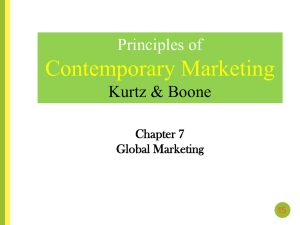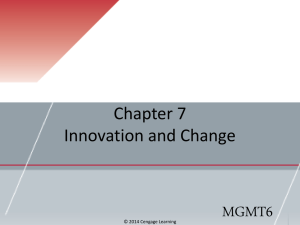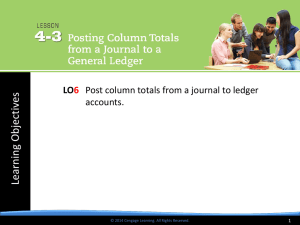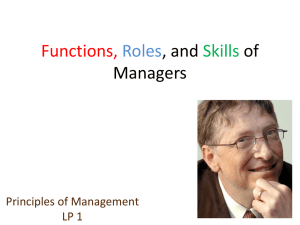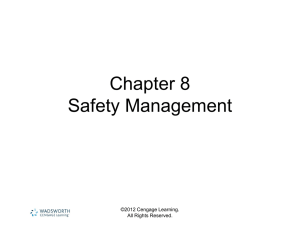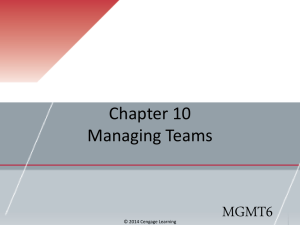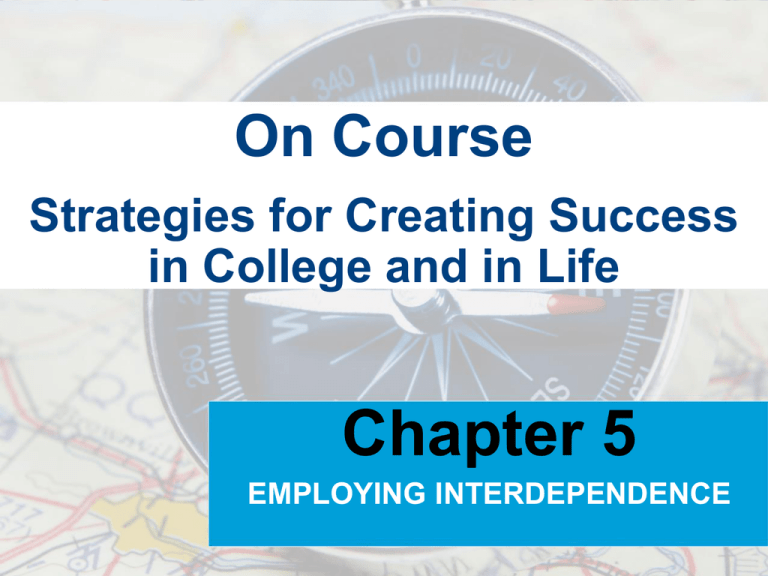
On Course
Strategies for Creating Success
in College and in Life
Chapter 5
EMPLOYING INTERDEPENDENCE
CHOICES OF SUCCESSFUL STUDENTS
EMPLOYING INTERDEPENDENCE
Copyright © Cengage Learning. All rights reserved.
5|2
REVIEW: SELF-MANAGEMENT QUADRANTS
In which quadrant would you place the following
activities?
I
II
IV
Spending three hours
writing a major paper due
at 8 a.m. the next day.
Spending one hour a day
on an assignment due in
two weeks.
Watching a movie you’ve
already seen three times
when you have a test the
next day.
Copyright © Cengage Learning. All rights reserved.
III
II
Spending two hours
helping a friend look for a
lost cell phone when you
need to finish a paper
that is due in the morning.
Spending ten minutes
each evening checking
your Next Actions list to
plan for the following day.
5|3
REVIEW: SELF-MANAGEMENT TOOLS
What provides a list of
important actions that need to
be done numerous times to
achieve a goal?
Tracking
Form
What provides a list of
important actions that need to
be done as soon as possible?
Next
Actions
List
What provides a list of
important actions that can be
done only at a particular time?
Monthly
Calendar
Copyright © Cengage Learning. All rights reserved.
5|4
REVIEW: DEVELOPING SELF-DISCIPLINE
What question can
you ask yourself to
strengthen focus?
What question can
you ask yourself to
enhance persistence?
Copyright © Cengage Learning. All rights reserved.
What are my
goals and
dreams?
Do I love myself
enough to keep
going?
5|5
CASE STUDY IN CRITICAL THINKING:
PROFESSOR ROGERS' TRIAL
Which character in the story is most
responsible for the team's grade of D? Be
prepared to explain your answer.
DIVING DEEPER: Imagine that you have been
assigned to a group project in one of your
college courses and that the student whom
you chose as most responsible for the group’s
grade of D (Anthony, Sylvia, or Donald) is in
your group. What positive actions could you
take to help your group be a success despite
this person?
Copyright © Cengage Learning. All rights reserved.
5|6
DEVELOPING MUTUALLY
SUPPORTIVE RELATIONSHIPS
FOCUS QUESTION
How could you make accomplishing your
success a little easier and a lot more fun?
Copyright © Cengage Learning. All rights reserved.
5|7
FOUR WAYS OF RELATING
Dependence:
I can’t achieve my goals by myself.
Codependence:
I have to help other people get their goals
before I can pursue my own goals.
Independence:
By working hard, I can get some of what I
want all by myself.
Interdependence
I know I can get some of what I want by
working alone, but I’ll accomplish more
and have more fun if I give and receive
help.
:
Copyright © Cengage Learning. All rights reserved.
5|8
QUICK REVIEW!
Identify the way of relating that is
depicted in each of the following
statements. Be ready to explain your
answer.
NOTE: Some statements may have
more than one correct answer...
Copyright © Cengage Learning. All rights reserved.
5|9
QUICK REVIEW
Kyle helps Cherie with her
writing assignments and
she tutors him in math.
Candace always lets Kim
copy her homework
because she doesn't want
Kim to get mad at her.
Joe refuses to go to the
tutoring center: "If I can't
learn this by myself, then I
shouldn't be in college."
Copyright © Cengage Learning. All rights reserved.
Interdependence
Codependence
(Candace)
Dependence
(Kim)
Independence
5 | 10
JOURNAL ENTRY 16: WARM-UP
What past experience of yours might
make it challenging for you to choose
interdependence?
What could your Inner Guide say to
help you choose interdependence
when doing so would help you achieve
your desired outcomes and/or
experiences?
Copyright © Cengage Learning. All rights reserved.
5 | 11
ONE STUDENT'S STORY:
Jason Matthew Loden
What choice(s) does Jason make that
demonstrate interdependence?
What similar choices could you make to
achieve greater success in college?
Copyright © Cengage Learning. All rights reserved.
5 | 12
CREATING A SUPPORT NETWORK
FOCUS QUESTION
How could you create and sustain an
effective support network to help achieve
your greatest dreams in college and in life?
Copyright © Cengage Learning. All rights reserved.
5 | 13
QUOTATIONS
Choose one quotation in the margin of
the “Creating a Support Network”
section.
Write why you agree or disagree with
the quotation. (3 minutes)
Join a partner and share/compare what
you have written.
Be prepared to share with the class
what your partner says.
Copyright © Cengage Learning. All rights reserved.
5 | 14
JOURNAL ENTRY 17: WARM-UP
1. Write about a time when someone was a great
help to you. (5 minutes)
2. Pair up.
3. Partner A, read what you wrote to Partner B.
4. Partner B, ask questions to clarify anything you
don’t understand. Then state in your own words
what you heard your partner say.
5. Reverse roles and repeat Steps 3 & 4.
Copyright © Cengage Learning. All rights reserved.
5 | 15
ONE STUDENT'S STORY:
Neal Benjamin
Pick out what you believe is the most
significant "Creator statement" in Neal’s
story.
Explain to a partner why you chose that
statement and how you might apply it
to help you achieve your desired
outcomes and experiences.
Copyright © Cengage Learning. All rights reserved.
5 | 16
STRENGTHENING
RELATIONSHIPS WITH ACTIVE LISTENING
FOCUS QUESTIONS
Do you know how to strengthen a relationship
with active listening?
What are the essential skills of being a good
listener?
Copyright © Cengage Learning. All rights reserved.
5 | 17
ACTIVE LISTENING
Which of the following listening
skills do you think will be the most
challenging for you?
STEP 1
STEP 2
STEP 3
STEP 4
Listen to understand
Clear your mind and remain silent
Ask the person to expand or clarify
Reflect the other person's thoughts
and feelings
Copyright © Cengage Learning. All rights reserved.
5 | 18
PRACTICING ACTIVE LISTENING
1. Form a trio. Decide who will be A, B and C.
2. Person A, tell Person B about the most useful or
interesting thing you have learned so far in this class;
Person B, use Active Listening skills. (3 minutes)
3. Person C, give Person B feedback about which Active
Listening skill s/he did well. Provide examples.
4. Rotate and repeat Steps 2 & 3. Person B talks to Person
C; Person A provides feedback to Person C.
5. Rotate and repeat Steps 2 & 3. Person C talks to Person
A; Person B provides feedback to Person A.
Copyright © Cengage Learning. All rights reserved.
5 | 19
INTERDEPENDENCE AT WORK
What incident have you witnessed (or can
imagine happening) in which independence
in the workplace interfered with achieving
desired outcomes and experiences?
Copyright © Cengage Learning. All rights reserved.
5 | 20
BELIEVING IN YOURSELF:
BE ASSERTIVE
FOCUS QUESTION
How can you communicate in a style that
strengthens relationships, creates better
results, and builds strong self-esteem?
Copyright © Cengage Learning. All rights reserved.
5 | 21
INEFFECTIVE COMMUNICATION
Placating
– Its okay if you don’t help with our
project in sociology. I’ll just do
the work myself.
– Please don’t be upset with me.
I'll drive your friends to the airport
and study for my math test later.
– I'm sorry. I should have cleaned
up the mess from our party last
night. I’ll do it right now.
Copyright © Cengage Learning. All rights reserved.
5 | 22
INEFFECTIVE COMMUNICATION
Blaming
– You never do anything to help
our study team. You’re just lazy!
– This room is a mess! When do
you plan to start doing your share
of work around here?
– My sociology instructor gives
unfair tests! He thinks he can ask
questions about anything that we
were supposed to read for
homework.
Copyright © Cengage Learning. All rights reserved.
5 | 23
EFFECTIVE COMMUNICATION
Leveling
– I know you've got a lot of work
to do tonight. Could we spend
just ten minutes cleaning up this
mess together?
– Before I can help you with your
paper, I need to finish studying
for a test. How about if you help
me review tonight and I'll work
with you on your paper
tomorrow afternoon?
Copyright © Cengage Learning. All rights reserved.
5 | 24
THREE STRATEGIES
THAT PROMOTE LEVELING
Communicate purposefully
Have a clear goal for your communication.
Communicate honestly
Express unpopular thoughts and upsets.
Communicate Responsibly
Be accountable by using “I Messages.”
Copyright © Cengage Learning. All rights reserved.
5 | 25
APPLYING THE CONCEPT
After reading each statement below, identify
whether it is placating, blaming or leveling.
I was really upset when you and your
friends came in at three o’clock last night,
laughing and yelling. I have to leave for
work at 6 a.m. and I need my sleep. Would
you agree to never do that again?
Don’t worry about waking me up last night.
I know you enjoy partying with your friends.
I’ll just go to work sleepy. If I get fired, I can
probably find another job.
Copyright © Cengage Learning. All rights reserved.
Leveling
Placating
5 | 26
APPLYING THE CONCEPT
You are such a jerk! You never show
respect for anyone. Why in the world
would you be yelling and slamming stuff
around at three o'clock in the morning?!
Man, you make me sick!
Blaming
Professor Hartley, I had a couple of
questions about my failing grade on the
test, and I'd like to make an appointment to
discuss those with you. Would tomorrow
morning during your office hours be a good
time? Say 9:30?
Leveling
Copyright © Cengage Learning. All rights reserved.
5 | 27
JOURNAL ENTRY 19: WARM-UP
On a clean piece of paper, create two columns.
Title one column “Assertive” and title the other
column “Unassertive.” In each column, list 10 or
more words that you associate with the key word.
Write for three minutes about the key differences
between being Assertive and being Unassertive.
Be prepared to share your writing.
On another piece of paper, create a sketch that
illustrates the essence of the two concepts:
Assertive and Unassertive. Be prepared to
explain your drawing.
Copyright © Cengage Learning. All rights reserved.
5 | 28
ONE STUDENT'S STORY:
Amy Acton
What assertive choices did Amy make and
how did those choices change her outcomes
and experiences?
What similarities and differences do you see
between Amy’s situation and yours?
What assertive choices could you make to
improve your own desired outcomes and
experiences?
Copyright © Cengage Learning. All rights reserved.
5 | 29
EMBRACING CHANGE:
DO ONE THING DIFFERENT THIS WEEK
Look at the list of 10 beliefs and behaviors
regarding interdependence.
Which is the one you are least inclined to
do?
Dive deep and explore why. See if you can
learn something important about how you
view interdependence.
Copyright © Cengage Learning. All rights reserved.
5 | 30
REVIEW
What are the four components of the
CORE Learning System?
•
•
•
•
Collecting
Organizing
Rehearsing
Evaluating
Copyright © Cengage Learning. All rights reserved.
5 | 31
BECOMING AN
ACTIVE LEARNER: TRANSLATION
One effective method of memorization is
"translating."
First, translate verbal information (ideas
expressed in words) into visual information
(ideas expressed in pictures).
Second, translate the information back into
words by explaining the picture to someone
else.
Copyright © Cengage Learning. All rights reserved.
5 | 32
EXAMPLE OF TRANSLATION
Here’s a visual way to remember the three
qualities of leveling:
A porpoise (purposeful)
is swimming to Abraham Lincoln (honest)
because it’s responsible for returning his
wallet
Copyright © Cengage Learning. All rights reserved.
5 | 33
BECOMING AN
ACTIVE LEARNER: TRANSLATING
One of the key reasons that some cognitive
psychologists believe the translation
strategy works because of "dual encoding.”
That means the brain stores information in
both visual and verbal form.
Copyright © Cengage Learning. All rights reserved.
5 | 34
BECOMING AN ACTIVE
LEARNER: PRACTICE TRANSLATING
Translate one of the following into a picture and be
prepared to explain your drawing. Feel free to use
the On Course text for the information.
• 5 suggestions for writing a meaningful journal
• 5 things you Collect when reading
• 4 ways to refute irrational beliefs
• 4 self-management tools
• 3 ways to empower your affirmation
• 3 principles of deep and lasting learning
Copyright © Cengage Learning. All rights reserved.
5 | 35
KEY CHOICES FOR
EMPLOYING INTERDEPENDENCE
Using
Active
Listening
Creating a
Support
Network
Developing Mutually
Supportive
Relationships
Copyright © Cengage Learning. All rights reserved.
5 | 36
TICKET OUT
What example did your parents (or other
important adult in your life) set for you in
regard to employing interdependence?
Copyright © Cengage Learning. All rights reserved.
5 | 37
End
Chapter
Five
Copyright © Cengage Learning. All rights reserved.
5 | 38

